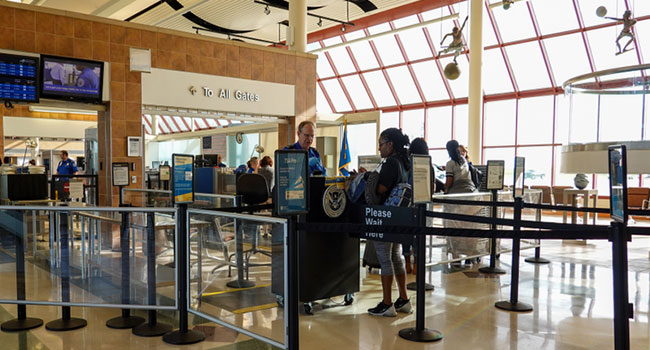
TSA Requires Security Officers to Wear Masks in Screening Areas to Prevent Coronavirus Spread
The agency plans to receive millions of masks in the next few weeks to distribute to employees, but most agents will wear surgical masks rather than the more expensive N95 respirators.
- By Haley Samsel
- May 08, 2020
Airport security agents will now be required to wear masks in screening areas to prevent further spreading of the coronavirus, the Transportation Security Administration confirmed on Thursday.
Employees were informed of the policy during a virtual town hall with Administrator David Pekoske on Wednesday. On Thursday, the agency officially announced mandatory mask policies for security officers, federal air marshals and baggage employees.
Already, more than 500 TSA employees have been diagnosed with COVID-19 and at least six have died, according to The Washington Post.
“TSA is making this change to protect our employees and travelers as social distancing cannot always be maintained in the screening process,” Pekoske said in a statement.
Previously, masks had been optional for employees, many of whom had advocated for better provisions of surgical masks and N95 respirators, which provide stronger protection against airborne disease. According to Reuters, Pekoske said during the town hall that TSA will receive millions of masks in the next few weeks, but most would be surgical masks rather than the more costly N95s.
Read More: TSA Faces Record-Low Numbers of Travelers, Coronavirus Outbreak Among Employees
Pekoske added that the airport screening process will never become “completely touchless,'' though the TSA will allow passengers to go through machines twice in order to reduce pat downs and close contact. Other steps have been taken at airports across the country: Floor markers have been installed to help travelers maintain social distancing, and some clear barriers have been put in place to stagger lines so that passengers are more spaced out.
“We can reduce the number of times we get in close proximity to a passenger to a significant degree and then mitigate a good portion of the rest of the risk with personal protective equipment,” Pekoske said.
No decision has been made about required temperature checks of passengers, noting that questions were still unanswered about where those checks would take place and which government agency would perform them, Reuters reported.
The TSA announcement also did not address if travelers will be required to wear face coverings, though they are already encouraged to do so. Individual airports, including Los Angeles International Airport, are making masks mandatory for travelers, and airlines such as Delta and United are implementing similar policies.
Airlines for America, a major trade group representing North American airlines, applauded TSA’s move on Thursday but called for further action on passenger requirements.
“While requiring facial coverings for TSA officers is an important and necessary step, we encourage the TSA and U.S. airports to similarly require facial protection for all travelers, in keeping with CDC recommendations,” A4A said in a press release. “This would ensure needed consistency for the duration of the passenger journey and instill greater confidence for the traveling public that the airlines, airports and federal government are prioritizing their health and safety.”
About the Author
Haley Samsel is an Associate Content Editor for the Infrastructure Solutions Group at 1105 Media.